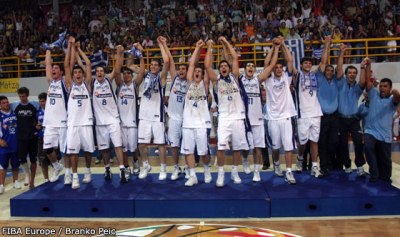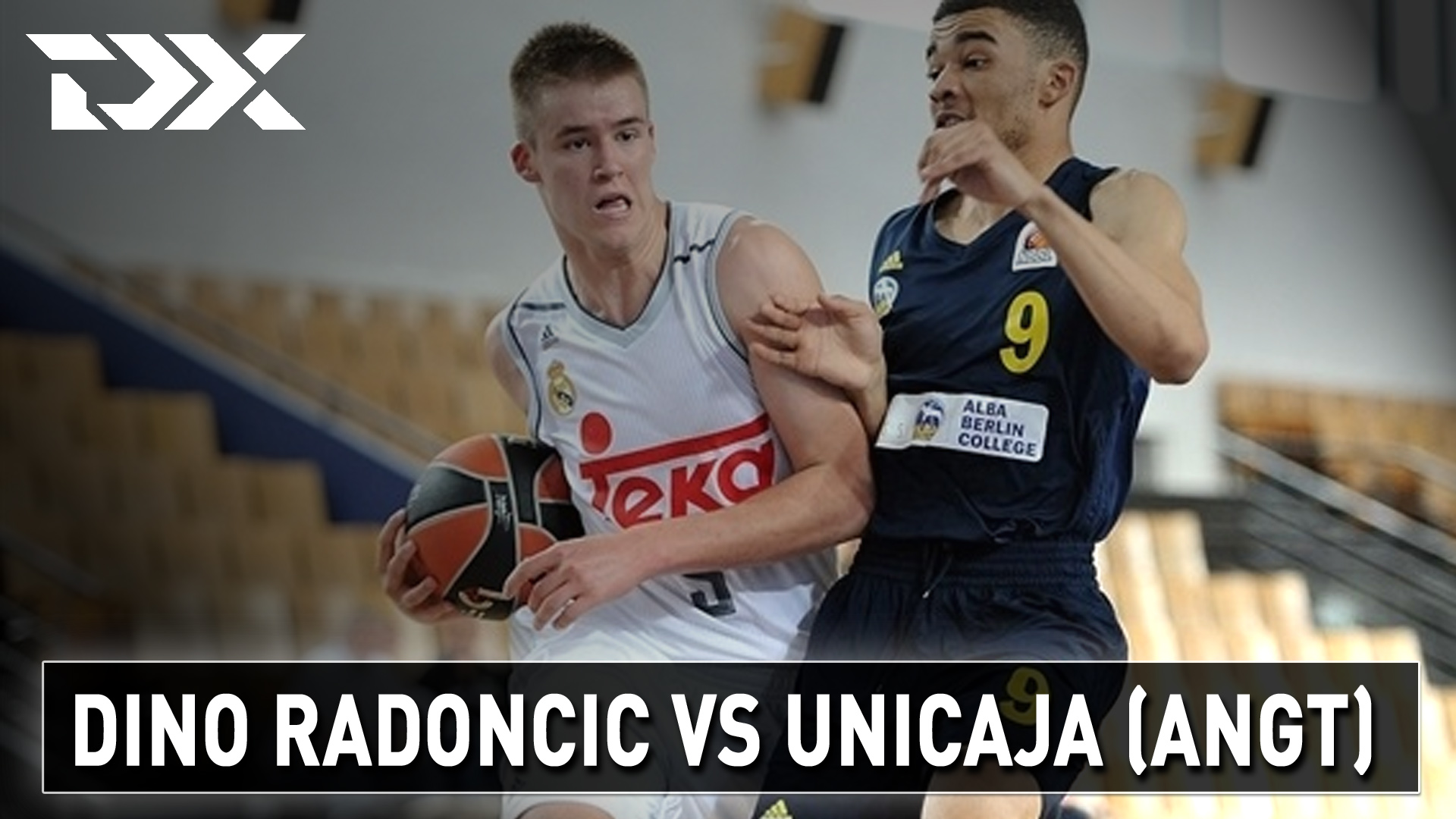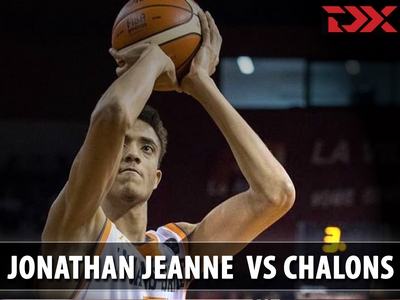Dominating Greece
Proving that their Albert Schweitzer Tournament title in Mannheim wasn't a fluke, an invigorated Greece extended its dominance throughout the tournament, earning a very well-deserved European junior championship (the first ever for Greece at this category). The core that shined back in Germany was perfectly complimented and strengthened by Zisis Sarikopoulos, a center that just provided what this team lacked the most: size and a real presence in the paint.
Showing amazing maturity, the smartest backcourt in the event, the typical toughness and competitiveness you expect from a Greek squad, and a rock solid core, they were the well-deserved winners.
That outstanding Greek backcourt was formed by Kostas Sloukas and Nikos Pappas. While Pappas had been the great dominator back in Mannheim, it took him some games here to start rocking with his perimeter stroke and slashing moves, smartly using his body and footwork to get the job done against quicker opponents.
Meanwhile, Sloukas emerged as the team's best player, probably even the championship's real MVP. The 6-2 left-handed point guard was an extremely steady presence for his team, providing basketball IQ, scoring, creation, distribution and leadership.
3373
A solid ball-handler and a pretty nice shooter, Sloukas showed his intriguing off-the-dribble shooting mechanics with range out to the three point line and a nicely quick release. He excelled in pick-and-roll situations, being able to feed the rolling man, punish traps, stick a mid-range jumper or stay aggressive attacking the basket. He was also an extremely active presence under the boards, coming up with almost 6 rebounds per game, an outstanding amount for a player his size considering the people he had around him. On top of everything, he delivered a perfect combination of under control and creative playmaking.
A solid ball-handler and a pretty nice shooter, Sloukas showed his intriguing off-the-dribble shooting mechanics with range out to the three point line and a nicely quick release. He excelled in pick-and-roll situations, being able to feed the rolling man, punish traps, stick a mid-range jumper or stay aggressive attacking the basket. He was also an extremely active presence under the boards, coming up with almost 6 rebounds per game, an outstanding amount for a player his size considering the people he had around him. On top of everything, he delivered a perfect combination of under control and creative playmaking.
One of the most intriguing players on the Greek squad was Kostas Papanikolaou. Whenever he was forced to play power forward in Mannheim due the lack of size of his national team, the arrival of Sarikopoulos regularly moved him to the small forward position. The upside, he proved to be able to play on the perimeter and he did a bit of everything: shooting, rebounding, passing and even slashing; the guy is talented and shows nice basketball IQ. The downside, playing as a four did help him to operate more comfortably on court, particularly with his face-up game, to take opponents off the dribble or punish them with his jumper when they weren't aggressive enough defending the perimeter. Besides, his defense against quick small forwards looked questionable, as his lateral mobility isn't the best around.
The frontcourt was completed by Lonidas Kaselakis, an undersized power forward with very limited potential, but pretty effective here with his turnaround jumpers and spot-up three pointers, and Zisis Sarikopoulos, who looked pretty improved from the last time we saw him. The UAB alumni (who is transferring to Ohio State and will sit out next year) was very useful in pick-and-roll settings, and in the low post, were he showed some nice moves and a certain soft touch delivering hooks with his left hand. On defense, he was extremely valuable, using his big body, intimidating and rebounding. His spotlight moment came against Serbia, when he completely owned Dejan Musli on both ends of the floor.
Let's not forget Vladimir Jankovic, the Serbian native (son of Boban Jankovic) who went off to an excellent tournament start, but fell injured in the third game against Belgium.
3376
The swingman, who stands somewhere between 6-7 and 6-8, showcased a decent perimeter touch from standstill positions, as well as the ability to knock down shots off the dribble, but especially took advantage of his athleticism and footwork to score off slashing and fastbreak situations. He also gave a serious hand in the rebounding department, cashing in off his leaping ability and notable wingspan. Not always under control, he still enjoys nice potential. He will play on loan in Serbia this year for Mega Ishrana, and has a long-term contract with Panionios.
The swingman, who stands somewhere between 6-7 and 6-8, showcased a decent perimeter touch from standstill positions, as well as the ability to knock down shots off the dribble, but especially took advantage of his athleticism and footwork to score off slashing and fastbreak situations. He also gave a serious hand in the rebounding department, cashing in off his leaping ability and notable wingspan. Not always under control, he still enjoys nice potential. He will play on loan in Serbia this year for Mega Ishrana, and has a long-term contract with Panionios.
With this core, Greece should be one of the main favorites for next year's U-19 World Championship in New Zealand. Without Serbia, and without Ricky Rubio playing for Spain, USA seems like the natural challenger for the title (with Argentina as a dark horse), but Greece has an excellent backcourt that will never panic against aggressive defenses, they can dominate the tempo, they are physical, they have a variety of perimeter shooters and they have size (except for the power forward spot). Bottom line, the Americans will have to bring a really good squad if they want to finally win back this championship after so many disappointing international showings.
Serbian Collapse
Nobody would have foreseen how this U-18 European Championship unfolded for Serbia. They were the legit favorites to win it all, the team with the best talent to get it done, a superb collection of excellent players, starting with half of the FMP Team that had dominated Europe this past season, and a few other excellent pieces from other teams. But they failed miserably, they failed against the top teams, missed the semifinal round, and summarizing a pathetic end for a pathetic tournament, couldn't overcome a Rubio-less Spanish team for a place in next year's U-19 World championship.
With the small sample we've been able to watch out of the Serbian participation, we have greatly missed any kind of fluidity in the game. It's concerning, for example, that Filip Sepa, as good a scorer as he is, became such a big offensive reference absorbing way too much offensive flow- when you have so many good players on court around him able to orchestrate a team offense.
As a result, many players didn't look like themselves, starting with the FMP core, especially Musli and Milutinovic (also Subotic at times) who were meant to play a key role in this team, and looked somewhere between frustrated and disinterested.
On a related note, and not that we were rooting for his calling to the Serbian National Team, we've recently get to known a rather intriguing point guard born in 1991, not included in the team that played in Greece, who answers by the name of Niksa Nikolic. It seems like an appropriate occasion to introduce him.
A teammate of Filip Sepa in Zemun (which happens to be one of the very few squads, if not the only one, able to beat the almighty FMP junior team this season), Nikolic is a very talented playmaker who evolves on court with a natural flair. Rather creative, flashy at times, his body language illustrates how easily the game seems to come to him. An excellent ball-handler with his right hand, improvable with his left, Nikolic sneaks his skinny body between rivals quite comfortably, usually going right and stepping into the lane, also relying on his nice quickness. Primarily a passer, it's mostly a matter of seeing the court and finding his teammates effortlessly, but also a result of his struggles with his perimeter jumper. Still a first-year junior, his underdeveloped body looks promising, showing a nice wingspan and already more size than the 6-1 he's usually listed at.
Hopefully, he will join next year's squad, which along with the rest of the exceptional 1991 Serbian generation, should put them back on top at the junior stage.
A teammate of Filip Sepa in Zemun (which happens to be one of the very few squads, if not the only one, able to beat the almighty FMP junior team this season), Nikolic is a very talented playmaker who evolves on court with a natural flair. Rather creative, flashy at times, his body language illustrates how easily the game seems to come to him. An excellent ball-handler with his right hand, improvable with his left, Nikolic sneaks his skinny body between rivals quite comfortably, usually going right and stepping into the lane, also relying on his nice quickness. Primarily a passer, it's mostly a matter of seeing the court and finding his teammates effortlessly, but also a result of his struggles with his perimeter jumper. Still a first-year junior, his underdeveloped body looks promising, showing a nice wingspan and already more size than the 6-1 he's usually listed at.
Hopefully, he will join next year's squad, which along with the rest of the exceptional 1991 Serbian generation, should put them back on top at the junior stage.
Motiejunas, the MVP
For the second consecutive year, the MVP award went to a player on the 2nd placed team. Donatas Motiejunas, the single most promising player seen in this championship, claimed the trophy with another exhibition of his offensive repertoire (18.2 points per game).
The Lithuanian wonder hasn't been able to relax and enjoy his award much, as right after finishing his participation in the U-18 championship, he came to Latvia for the U-20 stage, and he's already playing here, so we'll write more extensively on him in the U-20 reports.
Cadet Monster
A cadet topping the rebounding ranking in a European junior championship isn't the most common thing seen in basketball. Actually, I'm not even sure it has ever happened. Enes Kanter did it.
Showing comparable strength to a junior -if not superior- in his 6-9 body, Kanter is not about jumping out of the gym. The kid shows decent athleticism, but his leaping ability is not top notch. On the contrary, he relies on his superb positioning, willingness to pursue the ball on both ends of the court, and excellent timing. Kanter uses both arms, and isn't scared to leave the ground even in horizontal moves (many players fear for their ankles in these situations), so his rebounding range is pretty good. He also enjoys terrific hands to grab the ball, and the poise to know when to make every effort. The only downside we see in his rebounding display is the fact that he's not much about boxing out opponents, as much as he is about going out and grabbing the rebound, which isn't necessarily the best option team-wise.
Averaging 14.6 captures per game, Kanter surpassed the 20-rebound mark on three separate occasions, and earned himself a place on the all-tournament team, despite the fact that Turkey finished ninth in the championship.
3379
Moving to his offensive game, he's mostly an off-the-ball guy. He produces near the basket out of dishes from his teammates, showing great poise to finish under the rim against tall opponents, and of course, off offensive rebounds. He's also rather active setting picks, but rarely produces after rolling inside (a move he doesn't execute with enough faith). But you can also see him playing in the low post, being aggressive and physical, often pounding his opponent with his left shoulder to look for a right-handed hook or a pivot move to get by his match-up. In very rare occasions you will witness Kanter putting the ball on the floor at this stage; anyway, he usually uses his right hand, but shows average results. He can also attempt a jump-shot with decent range (he even connected on a three-pointer during the championship) but still with mixed results. Defensively, he's not a great intimidator, but shows decent lateral mobility and positioning to stay between the ball and the basket.
We still don't see out-of-this-world potential in Kanter, but given his youth, it's better to be cautious about his future. For the moment, the guy looks like the early favorite to clinch MVP honors in the upcoming U-16 European Championship (as long as Turkey stays competitive). By the way, regarding the real birthdate of Kanter-- a subject of controversy considering that he looks mature way beyond his age-- someone pointed to me his place of birth: it has to be pretty difficult to play with your birthdate in Zurich, Switzerland.
Showing comparable strength to a junior -if not superior- in his 6-9 body, Kanter is not about jumping out of the gym. The kid shows decent athleticism, but his leaping ability is not top notch. On the contrary, he relies on his superb positioning, willingness to pursue the ball on both ends of the court, and excellent timing. Kanter uses both arms, and isn't scared to leave the ground even in horizontal moves (many players fear for their ankles in these situations), so his rebounding range is pretty good. He also enjoys terrific hands to grab the ball, and the poise to know when to make every effort. The only downside we see in his rebounding display is the fact that he's not much about boxing out opponents, as much as he is about going out and grabbing the rebound, which isn't necessarily the best option team-wise.
Averaging 14.6 captures per game, Kanter surpassed the 20-rebound mark on three separate occasions, and earned himself a place on the all-tournament team, despite the fact that Turkey finished ninth in the championship.
Moving to his offensive game, he's mostly an off-the-ball guy. He produces near the basket out of dishes from his teammates, showing great poise to finish under the rim against tall opponents, and of course, off offensive rebounds. He's also rather active setting picks, but rarely produces after rolling inside (a move he doesn't execute with enough faith). But you can also see him playing in the low post, being aggressive and physical, often pounding his opponent with his left shoulder to look for a right-handed hook or a pivot move to get by his match-up. In very rare occasions you will witness Kanter putting the ball on the floor at this stage; anyway, he usually uses his right hand, but shows average results. He can also attempt a jump-shot with decent range (he even connected on a three-pointer during the championship) but still with mixed results. Defensively, he's not a great intimidator, but shows decent lateral mobility and positioning to stay between the ball and the basket.
We still don't see out-of-this-world potential in Kanter, but given his youth, it's better to be cautious about his future. For the moment, the guy looks like the early favorite to clinch MVP honors in the upcoming U-16 European Championship (as long as Turkey stays competitive). By the way, regarding the real birthdate of Kanter-- a subject of controversy considering that he looks mature way beyond his age-- someone pointed to me his place of birth: it has to be pretty difficult to play with your birthdate in Zurich, Switzerland.
Other Notables
Completing the all-championship team with Motiejunas, Sloukas, Pappas and Kanter, the Croatian power forward Mario Delas stepped up to lead his team Croatia to the bronze medal. The very skilled and fundamentally sound albeit rather unathletic- big man showed his versatility staying effective in face-up situations with his jumper, passing game and slashing ability (despite his lack of explosiveness, he manages to step into the lane with solid ball-handling skills with both hands, footwork and excellent use of his body), as well as showing nice activity off the ball and good sense of positioning with some effective cutters, and could sparingly produce in the low post showing nice footwork and ability to finish with both hands. On the downside, defensively he's not particularly tough or active.
It's interesting to note that Delas outplayed Tomislav Zubcic, a much more intriguing player, but not as solid on the offensive end. Delivering noticeable ups and downs during the competition, there's little new we can say about Zubcic. He's the same athletic and multi-skilled big who seems somewhere in the middle between becoming an all-around dominant forward and a complete bust.
Following with another Croatian, Toni Prostran, better known for his scoring efforts (that upped him into the all-tournament team in last year's U-16 European Championship), emerged as the most prolific assist maker in the competition (5 per game) despite being a first-year junior (born in 1991), while nicely filling the much needed distribution role that this squad had lacked in the past (the Mannheim tournament, for example).
3381
The tiny guard relied on his nice quickness and ball-handling skills to disrupt defenses and dish the ball, with a particular tendency to feed the baseline and find his teammates on the arc, showing nice court vision in the process. Still he had time to average 16.1 points and showcase an inconsistent off-the-dribble jumper with range out to the three-point line, and his nice layups off slashing moves. Defensively, he was not the exception of the Croatian rule, and his efforts to stay in front of his match-ups as well as his general activity were rather underwhelming. Anyway, he doesn't look like a big-time prospect given his limited size and lack of elite athleticism to compensate.
The tiny guard relied on his nice quickness and ball-handling skills to disrupt defenses and dish the ball, with a particular tendency to feed the baseline and find his teammates on the arc, showing nice court vision in the process. Still he had time to average 16.1 points and showcase an inconsistent off-the-dribble jumper with range out to the three-point line, and his nice layups off slashing moves. Defensively, he was not the exception of the Croatian rule, and his efforts to stay in front of his match-ups as well as his general activity were rather underwhelming. Anyway, he doesn't look like a big-time prospect given his limited size and lack of elite athleticism to compensate.
Alberto Jodar continued playing a complimentary role for Spain, filling the power forward spot, which limited his ability to showcase his perimeter skills, and focusing on defense, rebounding and hitting open shots. He showed his nice touch from the perimeter (42.9% in three pointers), but also his ability to put the ball on the floor with his right hand --although again exposed severe limitations with his left as well. However, he was a first year junior playing with kids older than him; next year he will have the chance to assume a bigger role and show what he can really do on the basketball court.
Much like happened with Jodar, Nicolo Melli wasn't too much of an offensive reference for Italy. Actually, both have similarities in the sense that they are forwards placed at the four position in this category. Still, Melli looks a little bit more naturally skilled playing off the dribble. He showed the ability to put the ball on the floor with both hands, although he probably lacked aggressiveness attacking the rim and he's not the most explosive guy around to get by his opponents. Instead, his mid-range jumper looks pretty consistent, which still can't be said of his long-range stroke.
We end this report with the shooting guard Hristo Zahariev, just to note his achievement as the top scorer of the tournament with 19.2 points per game, leading Bulgaria to avoid being relegated out of Division A with a nice all around effort that included 7.7 rebounds, 2.7 assists, 2.7 steals and even 1 block per game!
Unfortunately, we weren't able to watch Bulgaria on tape, but Zahariev seems to have grown to 6-6 according FIBA Europe, which combined with his nice athleticism and excellent skill set, would make him a very serious player to watch.







































Comments